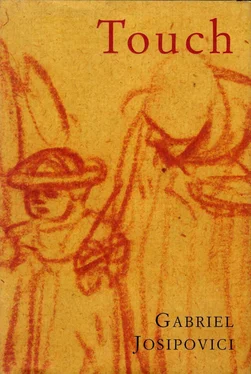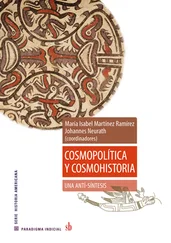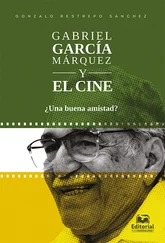Gabriel Josipovici - Touch
Здесь есть возможность читать онлайн «Gabriel Josipovici - Touch» весь текст электронной книги совершенно бесплатно (целиком полную версию без сокращений). В некоторых случаях можно слушать аудио, скачать через торрент в формате fb2 и присутствует краткое содержание. Год выпуска: 1996, ISBN: 1996, Издательство: Yale University Press, Жанр: Современная проза, на английском языке. Описание произведения, (предисловие) а так же отзывы посетителей доступны на портале библиотеки ЛибКат.
- Название:Touch
- Автор:
- Издательство:Yale University Press
- Жанр:
- Год:1996
- ISBN:0300066902
- Рейтинг книги:5 / 5. Голосов: 1
-
Избранное:Добавить в избранное
- Отзывы:
-
Ваша оценка:
- 100
- 1
- 2
- 3
- 4
- 5
Touch: краткое содержание, описание и аннотация
Предлагаем к чтению аннотацию, описание, краткое содержание или предисловие (зависит от того, что написал сам автор книги «Touch»). Если вы не нашли необходимую информацию о книге — напишите в комментариях, мы постараемся отыскать её.
Touch — читать онлайн бесплатно полную книгу (весь текст) целиком
Ниже представлен текст книги, разбитый по страницам. Система сохранения места последней прочитанной страницы, позволяет с удобством читать онлайн бесплатно книгу «Touch», без необходимости каждый раз заново искать на чём Вы остановились. Поставьте закладку, и сможете в любой момент перейти на страницу, на которой закончили чтение.
Интервал:
Закладка:
That charged moment enters into dialogue with Proust's equally charged depiction of the moment when the child discovers that he is not the centre of the world, that even his mother has a life and interests of her own, and in that instant discovers his profound dependence on her. In the Picasso the instinct to cling is overcome by the need to set out; in the Proust the need to know that the parent can be relied on in every circumstance turns the steadying touch into the anxious grasp, with inevitably tragic results. We have all of us experienced both emotions, and they have marked us for life. Who is to say which is the deeper or which has marked us more?
19 Kinetic Melodies
One of the ways in which the masters of suspicion worked was to reveal to us that what we had taken to be natural, a ‘given’, was in fact man-made, the result of choices and decisions made by individuals and institutions. Thus Marx unmasked the workings of capital, Nietzsche the workings of morality and Freud the workings of sexuality. Where the Enlightenment had seen all men as essentially unchanging and human nature as universal, the nineteenth-century masters of suspicion set about exploring the genealogies of morals and social institutions with the aim of freeing men from forms of bondage to which they did not even know they were subject.
The work of Oliver Sacks has stood at a curious angle to all this. He too is an unmasker, he too is concerned that we should see that much of what we take for granted needs to be examined critically. But his aim seems to be rather to make us aware of the extraordinary nature of what is unmasked, to fill us with wonder again at the almost miraculous nature of so much in our lives that we tend to take for granted. In one brilliant and illuminating article and book after another he has helped us to understand the complexity of the way the human mind and body function and of such apparently simple things as standing, walking and talking.
He has done this negatively, by exploring what happens when those things we normally take for granted no longer seem to function, when, for one reason or another, we cease to be able to cross a room, ask for a glass of water, remember what our husband or wife looks like. As he describes, with a novelist's empathy, patients who seem driven either to rush frantically forward or to stop dead in their tracks, either to gabble incoherently or to search hopelessly for the most ordinary words, we come to realise how amazing it is that we can walk up stairs without even thinking about it, communicate with our friends, understand what we are told and act upon it.
This was not of course his primary aim, which, in the time-honoured way of medical papers, was designed to explain illness where he found it and to suggest cures. Nor of course was he the first to bring empathy, imagination and a sharp eye for detail to bear on neurological problems affecting human beings. His own mentor, the great Russian neurosurgeon A. R. Luria, and such late nineteenth- and early twentieth-century medical experts as Sir Charles Bell, the author of a famous book on the mechanism of the hand, and Henry Head, the influential author of Studies in Neurology (1920), had already shown the way. But Sacks' unique writerly gifts brought this branch of medicine into general public consciousness, first with his extraordinary study of the aftermath of the great influenza epidemic of 1919, Awakenings , and then in a host of case studies published in non-medical journals, and later collected into books, such as The Man Who Mistook his Wife for a Hat and An Anthropologist on Mars .
But it was with a book he published in 1984 about an experience of his own, A Leg to Stand On , that Sacks brought to the centre of our attention the notions of proprioception and kinetic melody (a term coined by Luria). Having broken his leg on a Norwegian mountain during a holiday, Sacks discovered that, due not to a neuropathy but to a nerve and muscle injury, he no longer recognised die leg as his own. Not only could he not feel it, he had forgotten what it was like to have a leg. He recalled then a former patient of his who, in his half-sleep, would sense an alien presence in his bed and, in a fit of panic, struggle with it until he would eventually manage to hurl it out of bed — only to discover that it was his own leg and he was now lying on the floor. This had been totally baffling to the doctors and nurses at the time, but as Sacks struggled to understand what was happening to himself he began to ponder again the notion of body-image or proprioception, which has long been known in medicine but improperly understood.
Proprioception is our totally intuitive sense of our own bodies, without which we could not function at all, a kind of sixth sense which keeps our other senses in a balanced relation to each other, rather like the pentangle on Gawain's shield. More basic than sex or even desire, proprioception is the body's own sense of itself as occupying space and as active in that space. Deprived of this sense we are not merely helpless, we cannot even stand — let alone move. And yet so deeply is that sense buried within us, so much is it the ground of our being, that we take it totally for granted and only become aware of its crucial function when something goes wrong with it. Kinetic melody is the complement of this, our instinctive ability to write, sing, dance and so on, activities we could never do if we had to think through every movement of the hand or foot.
Sacks eventually recovered the use of his leg and the sense of his leg as his own, although it was to be ten years before he was able to write in any coherent way about his totally disorientating experience. Others have not been so lucky. In 1991 a pupil of Sacks, Jonathan Cole, published a book which told the story of a man who, at the age of nineteen, in the aftermath of a bout of gastric flu, was deprived of all sense of his body from the neck down, and never recovered. Pride and a Daily Marathon is Cole's extraordinary story of Ian Waterman and of his fight to lead a normal life despite the fact that he would never regain his proprioception. The book follows Waterman as he quite literally wills himself to function normally, which means, in effect, to imitate every detail of the movements of those he sees around him, since without a sense of his own body nothing can come naturally to him. At every second, therefore, he needs to be totally vigilant, lest, for example, a slight incline in the path, which we would adjust to without even becoming conscious of it, catch him unawares and cause him to stumble and fall, or the hand he moves towards his cup of tea fly suddenly sideways and strike his neighbour. Since when he cannot see his body he has no sense that it exists, darkness is the great enemy. Once, when he was alone in a lift, the lights failed and he was found in a crumpled heap on the floor when the doors were finally opened.
Ian Waterman's appalling plight, allied to his remarkable will and ability to express himself, along with Jonathan Cole's patience and empathy, makes one realise the vast range of complex things we do all the time without our even noticing. When we speak to others, for example, we speak with our bodies as much as with words. ‘Since his illness’, writes Cole,
Ian has lost all [his] unconscious body language and is no longer able to employ the myriad body postures and movements we use in communication and deception … Ian is aware of this lack and, as always, has evolved ways of circumventing it: ‘Sure, I realise that, say, to incline towards someone when sitting is a sign of affection. Remember, I was all right until the age of 19, so I had learnt all this movement behaviour by then. Now I sometimes use it, but only when sitting down, which allows me to do it without fear of falling, and I always have to think about it. I have to decide consciously to use my hands to move with and emphasise my speech.’
Читать дальшеИнтервал:
Закладка:
Похожие книги на «Touch»
Представляем Вашему вниманию похожие книги на «Touch» списком для выбора. Мы отобрали схожую по названию и смыслу литературу в надежде предоставить читателям больше вариантов отыскать новые, интересные, ещё непрочитанные произведения.
Обсуждение, отзывы о книге «Touch» и просто собственные мнения читателей. Оставьте ваши комментарии, напишите, что Вы думаете о произведении, его смысле или главных героях. Укажите что конкретно понравилось, а что нет, и почему Вы так считаете.












